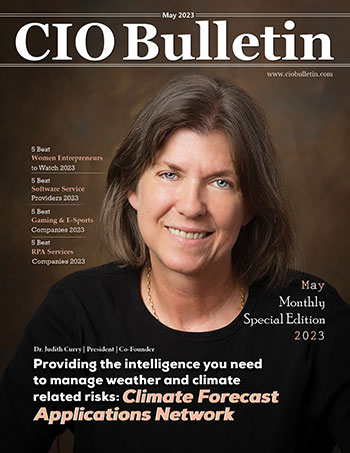CIO Bulletin

There is a growing need for advanced weather and climate forecast tools for protection of life and property, public health and safety, and support of economic prosperity and quality of life.
Climate Forecast Applications Network (CFAN) was founded in 2006 by Judith Curry and Peter Webster and launched under Georgia Tech’s VentureLab program. Their objective was to translate cutting-edge weather and climate research into forecast products that support the mitigation of weather and climate risks. Their initial opportunities and clients motivated the development of innovative extended-range forecasts of extreme weather events. They recognized early that the key to market adoption was working with their clients to evolve their forecast solutions to support effective decision-making. In recent years, CFAN has responded to growing needs for more realistic scenarios for regional climate change on decadal time scales that can be provided by global climate models.
In conversation with Dr. Judith Curry, President and Co-Founder, to get a thorough understanding of the company.
Tell us about your innovative approach in the services you provide.
CFAN is at the forefront of advancing new ideas and approaches in weather and climate services. The firm’s innovative approach to forecasting has earned the company a reputation as pioneers in the field, as it strives to push the boundaries of effective forecasting and enhance understanding of weather and climate prediction and predictability. It collaborates closely with its clients to develop new products and address their most complex weather-and climate-related problems, as well as identify lucrative opportunities in these areas. CFAN’s team is constantly committed to pushing the envelope and driving innovation in the field of weather and climate services.
CFAN is characterized by a true synergy between research, forecasts, and decision support have produced a culture of innovation and client support that is unique among weather and climate forecast providers.
Q. Explicate about your weather forecast services. How are they helpful to your customers?
CFAN is revolutionizing weather forecasting by utilizing state-of-the-art ensemble forecast methods, machine learning, and artificial intelligence. These cutting-edge techniques allow the company to provide highly accurate probabilistic forecasts of extreme weather events at longer lead times. It also leverages visual analytics and cognitive computing techniques to enable our clients to quickly and easily interpret forecast information through web-based dashboards, supporting timely and optimal decision-making.
CFAN’s competitive edge is associated with its advanced forecast calibration and ensemble interpretation techniques, forecast uncertainty characterization, and visual analytics and cognitive computing techniques to support the effective use of the forecast information.
CFAN’s TropiCast forecast products are widely used by organizations across the globe to plan, prepare for, and respond to the hazards associated with tropical cyclones. Its forecast innovations include an extended-range dynamic cone of track uncertainty, probabilistic forecasts of maximum intensity and minimum pressure, CFAN’s Rapid Intensification Index, and calibrated high-resolution forecast fields of landfall winds.
CFAN’s OmniCast is designed specifically for energy traders, electric power providers, and fund managers. This platform provides weather and climate forecasts, with a particular focus on extreme weather events, including probabilities of heat and cold waves, wind droughts, severe convective weather, and fire weather.CFAN’s AgriCast product provides regional forecasts that support precision agriculture, improving yields while reducing costs and resource use.
Q. Climate services bear the promise of becoming a new, remunerative market of knowledge-intensive services. Although several climate services have been developed, there has been little reflection on the kinds of services such a new market could encompass. How is CFAN different?
Most climate services companies focus on using archived simulations from global climate models, downscaling the outputs from these models, and then using these outputs to drive impact models. The problem with this approach is that global climate models show little skill in simulating regional climate variability on decadal time scales or in simulating extreme weather events. Further, the archived climate model simulations focus only on emissions scenarios, while ignoring the range of plausible scenarios of natural climate variability – solar variability, volcanic eruptions and changes in the large-scale ocean circulation regimes.
CFAN is advancing novel ideas and approaches in climate services. CFAN provides customized intelligence that responds to specific client requests for: climate scenarios and impact assessments; advice on corporate climate risk management; reports and educational materials; expert testimony and litigation support; and support for the development and evaluation of adaptation strategies.
CFAN’s primary innovation in climate services is a new approach for developing regional scenarios of future climate variability change on decadal time scales. Leveraging their strong expertise in climate dynamics, CFAN’s approach integrates projections of externally forced century-scale climate change with natural modes of climate variability and historical and paleoclimate data. In addition to climate model simulations, CFAN uses a network-based dynamic climatology based on multidecadal teleconnection indices and a physically-based storyline approach.
A common request from clients is for statistics on future extreme weather events, in terms of frequency and intensity. Low likelihood, high impact weather and climate events cause the greatest harm to vulnerable populations and assets in a particular region. Plausible worst-case scenarios can extend beyond the recent historical data record, owing to natural weather and climate variability as well as manmade climate change.
CFAN uses storyline approach for generating worst-case scenarios for different types of compound weather and climate events. The approach uses historical and paleo data as a basis. The event-based storyline approach breaks down each of the drivers of the event in terms of the atmospheric weather, seasonal climate drivers, multi-decadal climate regimes and global warming. The impact of global warming is accounted for by interpreting trends for the past century and using process models of the extreme event type. CFAN’s worst case scenarios are used by clients to stress test their systems, such as electric utilities and water resource managers.
CFAN’s climate scenario projections and impact assessments are supporting infrastructure siting, energy transition risks associated with electric power demand and renewable energy supply, insurance decisions, land investments, water resource management and planning, assessments of vulnerability to severe weather, and coastal adaptation planning.
Q. Throw light on you actively participating in your client’s decision-making?
CFAN has fostered a culture of client service and engagement, going beyond simply providing “off the shelf” forecast products to meet clients’ specific needs. CFAN frequently provides assessment reports and blog posts to educate clients about weather and climate-related risks. This level of engagement directly connects CFAN employees with client needs, promoting a collaborative relationship that generates ideas for new products and analysis reports.
Curry has come to realize the difficulty of different decisions that depend, at least in part, on weather and climate information. She has learned how crucial it is to carefully identify and communicate the uncertainty around scientific knowledge, especially when making forecasts. The worst consequence for decision-makers, in her experience, is a scientific conclusion or prognosis that was made with a high degree of confidence and turns out to be inaccurate. CFAN provides the most critical information about forecast accuracy and uncertainty that helps its clients improve outcomes as they manage weather and climate risks.
Visual analytics and cognitive computing techniques help clients easily and quickly interpret forecast information on web-based dashboards to make optimal and timely decisions. CFAN also provides customized forecast data streams that interface with the client’s impact models.

Q. Talk about your expertise in the field. What improvements did you observe?
Weather and climate services industries are thriving due to a growing realization of the socioeconomic impacts of extreme weather and climate change. The need for better solutions to an ever-broadening range of weather and climate impacts will continue to drive the economic prospects in this sector. CFAN is collaborating with several firms in the risk management field to create innovative strategies, tools, and information systems.
Although the weather services sector is well-established, Judith aims to expand the climate services industry to assist in planning and lessen susceptibility to severe weather and climate occurrences. She is partnering with multiple startup companies that have novel ideas categorized under “climate tech.”
Judith is keen on bringing forth a transformation in how we think about and respond to climate change. Judith’s expertise in advancing the climate services sector is demonstrated in her upcoming book, Climate Uncertainty and Risk (Anthem Press). “This book helps us rethink the climate change problem, the risks we are facing, and our response. It helps us strategize on how we can best engage with our environment and support human well-being, while responding to climate change. It provides a road map for formulating pragmatic solutions that can improve our well-being in the 21st century,” says Judith.
Meet the legend
Dr. Judith Curry established CFAN following a prominent career in academic research and administration. For 13 years, she held the position of Chair of Earth and Atmospheric Sciences at the Georgia Institute of Technology, where she is now a Professor Emerita. Dr. Curry has been recognized as a Fellow of the American Meteorological Society, the American Association for the Advancement of Science, and the American Geophysical Union. Her expertise in weather and climate has led to her being frequently called upon to provide testimony to Congress and serve as an expert witness.
Dr. Curry holds a Ph.D. in Geophysical Sciences from the University of Chicago.

Insurance and capital markets







